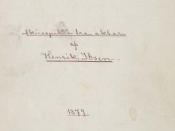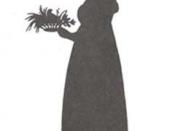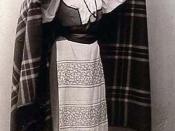Sometime after the publication of 'A Doll's House', Henrik Ibsen
spoke at a meeting of the Norwegian Association for Women's Rights. He
explained to the group, 'I must decline the honor of being said to have
worked for the Women's Rights movement. I am not even very sure what
Women's Rights are. To me it has been a question of human rights' ( ).
'A Doll's House' is often interpreted by readers, teachers, and critics alike
as an attack on chauvinistic behavior and a cry for the recognition of
women's rights ( ). Instead its theme is identical to several of his plays
written around the same time period: the characters willingly exist in a
situation of untruth or inadequate truth which conceals conflict and
contradiction ( ). In 'A Doll's House', Nora's independent nature is in
contradiction the tyrannical authority of Torvald. This conflict is concealed
by the way they both hide their true selves from society, each other, and
ultimately themselves.
Just like Nora and Torvald, every character in this
play is trapped in a situation of unturth. In 'Ghosts', the play Ibsen wrote
directly after 'A Doll's House', the same conflict is the basis of the play.
Because Mrs. Alving concedes to her minister's ethical bombardment about
her responsibilities in marriage, she is forced to conceal the truth about her
late husband's behavior ( ). Like 'A Doll's House', 'Ghosts' can be
misinterpreted as simply an attack on the religious values of Ibsen's
society. While this is certainly an important aspect of the play, it is not,
however, Ibsen's main point. 'A Doll's House' set a precedent for
'Ghosts' and the plays Ibsen would write in following years. It established
a method he would use to convey his views about individuality and the
pursuit of...


